Two signs hang over a sidewalk shop in downtown Santa Monica. One says, “exceptionally high-quality guitars” with a washed out picture of a Gibson Les Paul. The other, TrueTone Music. The exterior signage may look dull and faded. But the inside tells a different story. The vivid glow of each six-string lights up every room and seems to spotlight each customer as they run their eyes over the shop’s walls.
When you enter a store like TrueTone, you experience a small community. A dad accompanying his son to find the perfect acoustic. A pair of teens tuning and strumming together. An instructor welcoming his next lesson. And two middle-aged strangers improvising to each other’s notes from opposite sides of the room, with only a short wall of amps on display dividing them.
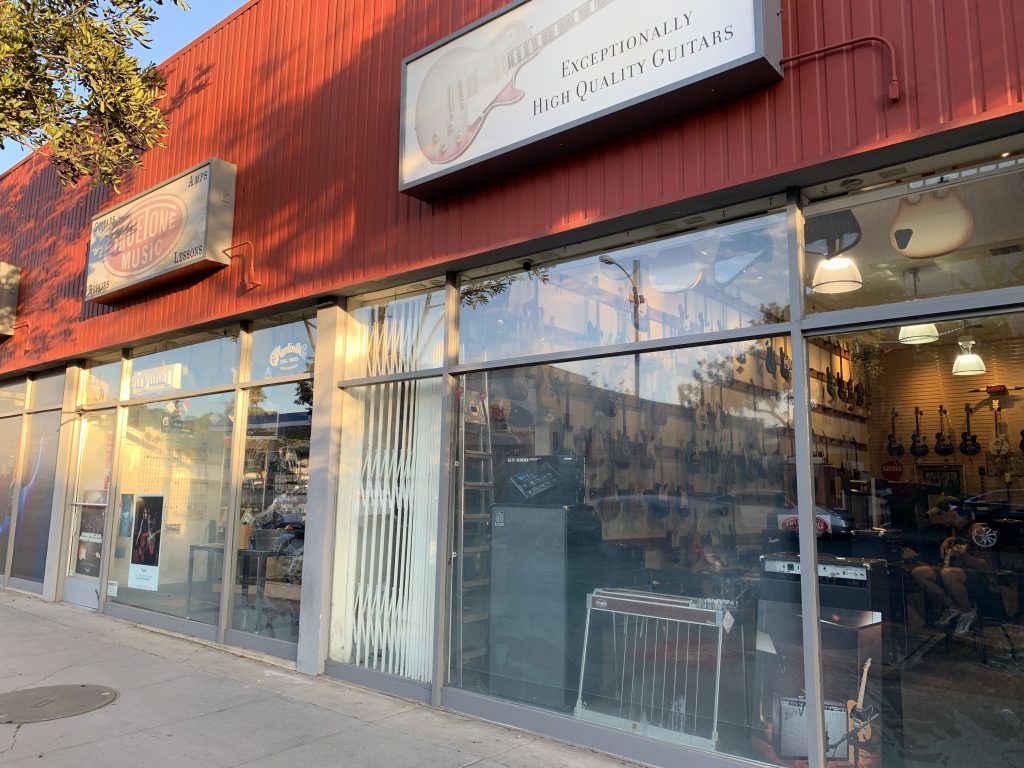
The TrueTone Music storefront is located in downtown Santa Monica. 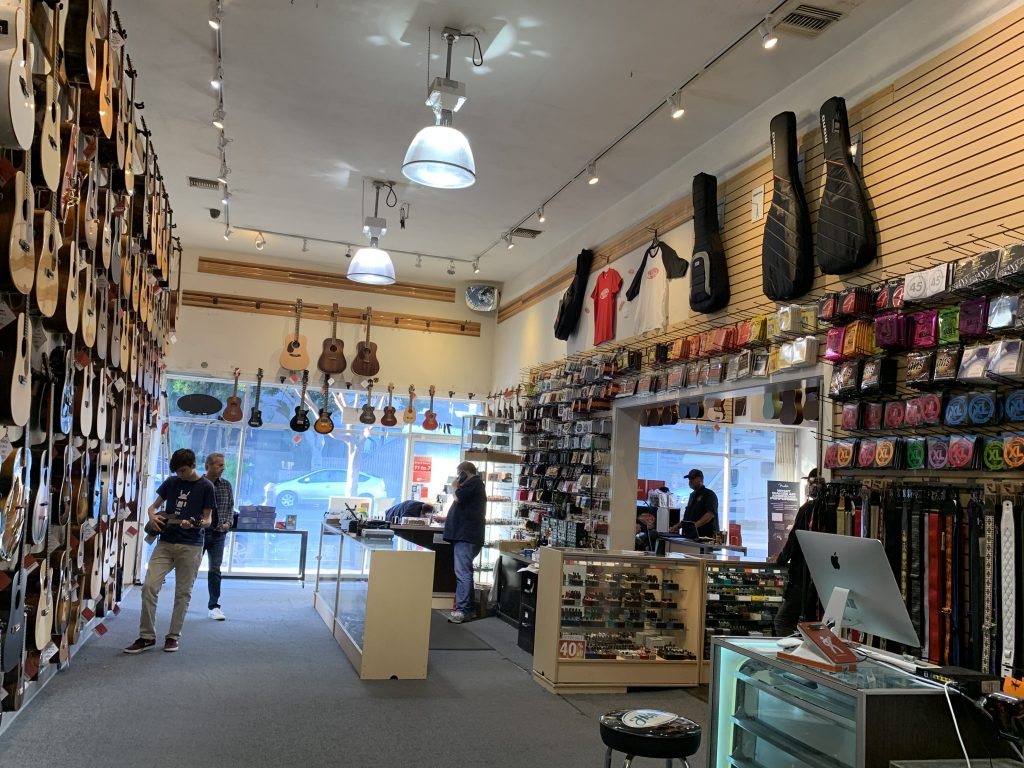
One of TrueTone’s rooms showcases a wide variety of acoustic guitars.
“This is what (going to music stores) was basically as I was growing up,” said Sunir Patel, co-owner of TrueTone Music.
Today’s TrueTone would be familiar to the 12-year-old Patel, a bass player from Cincinnati, Ohio. Back then, he would nerd out over guitars with his friends. Patel would read the latest guitar catalog knowing he couldn’t afford everything he wanted but could still be excited seeing all the equipment in person. He would hang out at a local guitar shop for hours until he had tried almost every guitar on the walls.
When he grew up, Patel worked for the legendary guitar company Fender for nearly 15 years. In 2011, he became a district sales manager, covering West Coast operations. Patel worked with many independent music instrument stores, TrueTone being one of them.
In July 2018, he left Fender to join TrueTone as a co-owner with Paul Flynn who has been with the shop since it was established in 1998.
It was a leap of faith.
With changing demographics and evolving music genres, some predict the guitar’s prominence might be fading. But Patel has a message for those who think the guitar is doomed.
“For those of us who are in this world, it couldn’t be further from the truth,” said Patel.
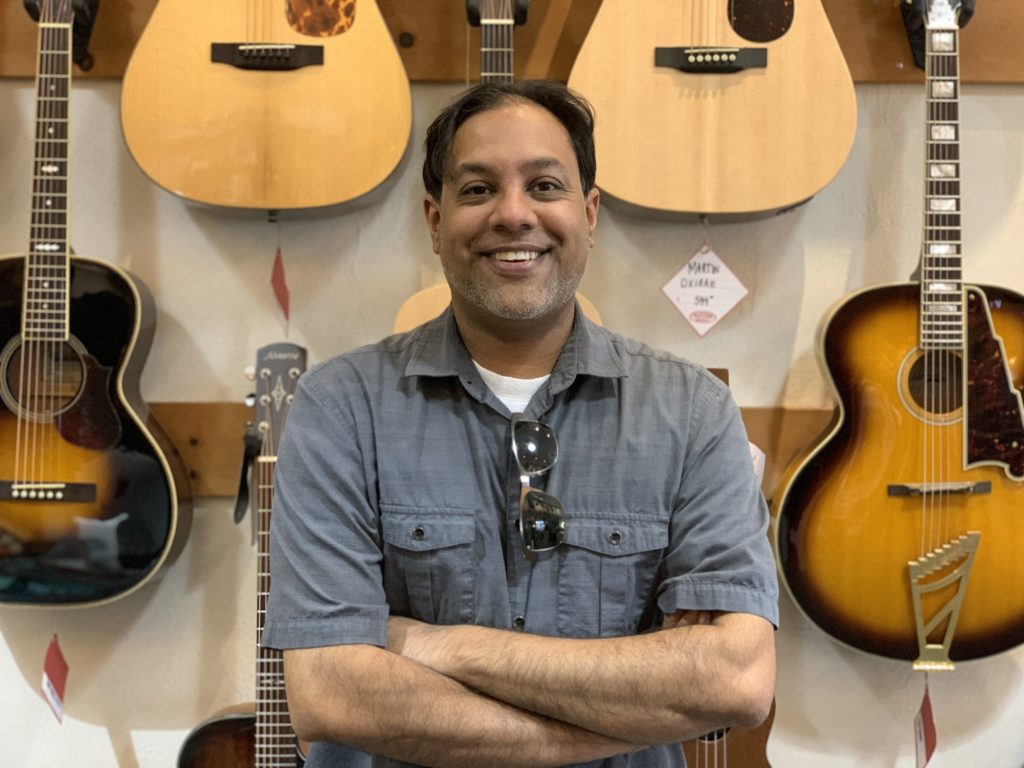
Sunir Patel, 39, has been the co-owner of TrueTone Music in Santa Monica since July 2018.
Patel has a message for those who think the guitar is doomed. “For those of us who are in this world, it couldn’t be further from the truth.“
Guitars by the numbers
In July 2017, the Washington Post published an article claiming that the electric guitar industry was dying. Retailers are looking for ways to adapt. Big chains like Guitar Center and Sam Ash are trying to boost their efforts and cater to more younger customers. Guitar Center spent $5 million renovating its flagship store on Sunset Boulevard in Hollywood. Last year guitar manufacturers like Gibson announced new executive leadership as the company emerged from a bankruptcy protection.
Electric guitar sales have fallen over the past decade. About 1.1 million electric guitars were sold in the U.S. in 2017, down from more than 1.6 million in 2005. Acoustic guitar sales kept steady with 1.5 million sold in 2017, down slightly from 1.6 million in 2005.
Patel and other guitar shop managers in Los Angeles say they’re doing fine. Though Patel did not fully disclose the shops exact numbers, he said sales in “both acoustic and electric guitars have remained about the same since 2015.”
Notable guitar shops in the greater Los Angeles area
Other independent store owners like Norman Harris, owner of Norman’s Rare Guitars in Tarzana, can attest to this. “I’ve been doing this for more than 30 years already,” said Harris, “People will still buy the guitar. If they pick it up, play it and like it, they’ll buy it.
The touch-play-buy cycle is also a key component in TrueTone’s business model, Patel said. Now the internet has become more involved as a guidance tool for customers.
Stores like TrueTone have adapted to a business model where the brick and mortar store compliments online access. With Patel onboard in 2018, the shop expanded its online presence . “A customer saw a guitar online. We messaged him back and forth online,” said Patel, “He drove to the store, played it and bought it. He had never been to the store. He found it because of the website.”
“A guitar is still something they want to feel, hear and…heck…even smell it before they buy it,” Patel said jokingly, “What people want is an experience…we want to be able to provide that and have that kind of an environment.
Changing Demographics
“It’s all a product of the changing demographic,” said Mark Goldstein, a professor of music industry at the USC Thornton School of Music. “Retailers are expecting sustained success without really pivoting their business models to match the ever-evolving industry and their customers.”
Goldstein also says that just because a guitar’s sound isn’t as prominent on the Billboard charts now as it was decades ago, it doesn’t mean the instrument is “on its deathbed.”
Sure, there will never be another Hendrix but there are still musicians who continue to inspire younger generations to pick up a guitar. These guitar heroes are taking new forms on different platforms whether they be in the Top 40 or on online platforms like YouTube and SoundCloud. They serve the same purpose as guitar heroes for newer generations.
“There is no significant decrease in the interest of playing guitar,” said Goldstein, “There are just more options, and more genres of music.”
Sounds of the Store
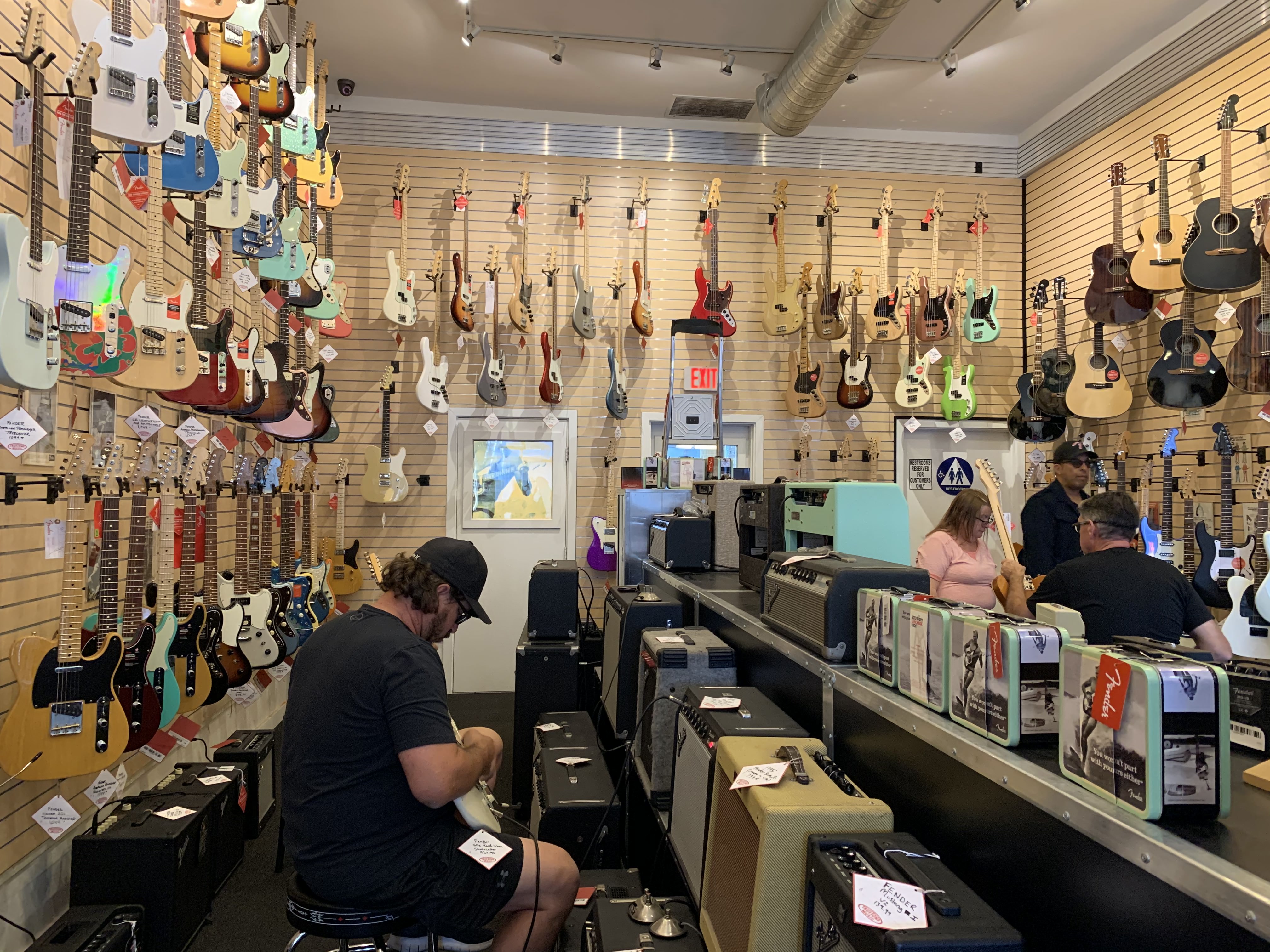
Customers sample guitars in TrueTone’s Fender showcase room.
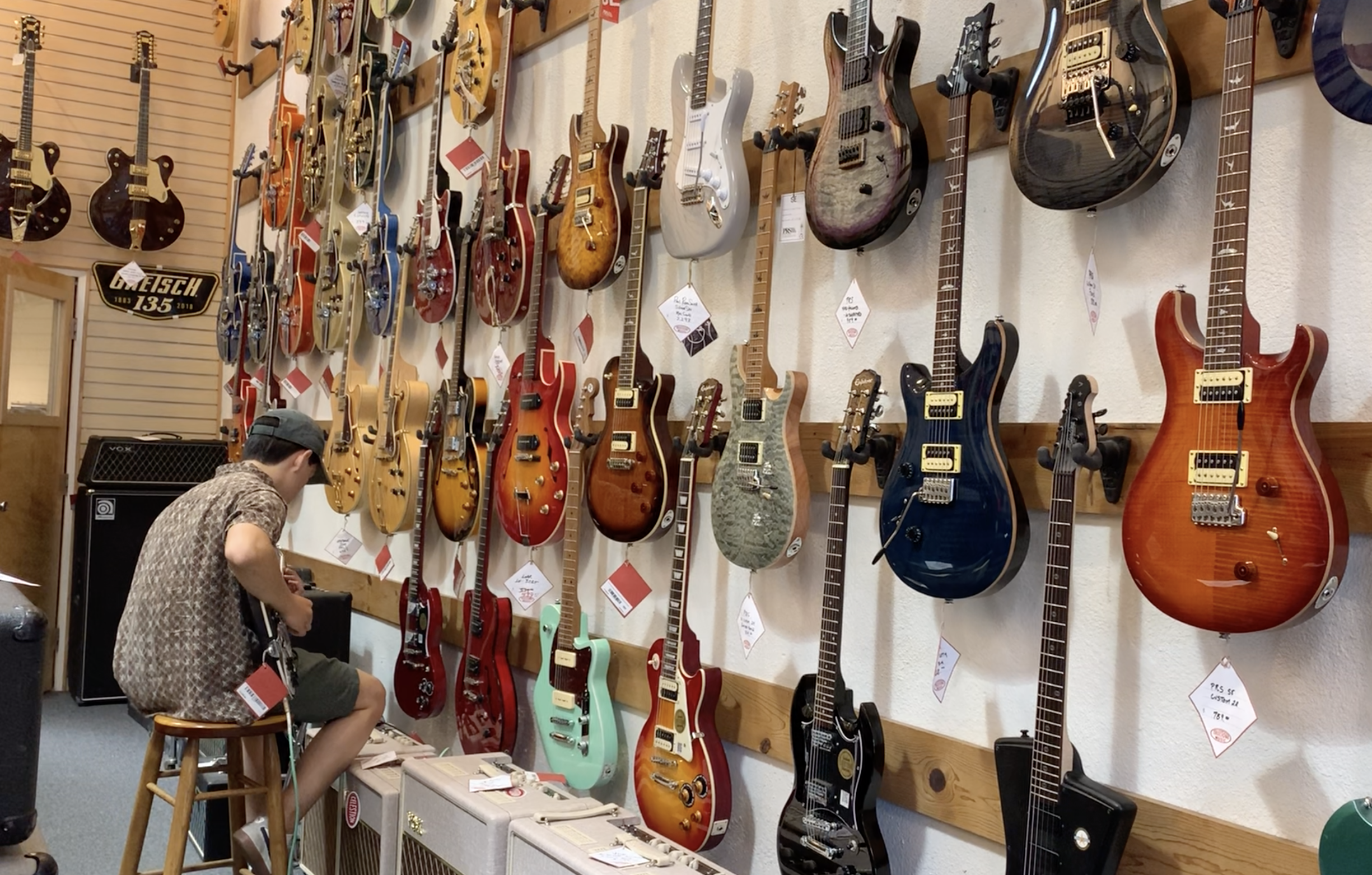
Brent Strickland, 19, plays a blues riff on a guitar he picked from the wall.
Patel believed he could help modernize the space for a changing industry with his store. His strategy is to keep beginners intrigued with an instrument they often abandon within a year, and to make them understand every aspect of the guitar from its strings to its switches and buttons.
“As much as we love the old school guys who have been shopping here for almost 20 years,” said Patel, “they are now trying to get rid of gear instead of buying more of it.”
He has seen a noticeable shift in new faces coming into his store, as younger people become regulars. His hope is they will be customers for life. “When [the customers] come into our store, they know who these [employees] are,” Patel said, “They’ve been working at this store for years and we have no turnover.”
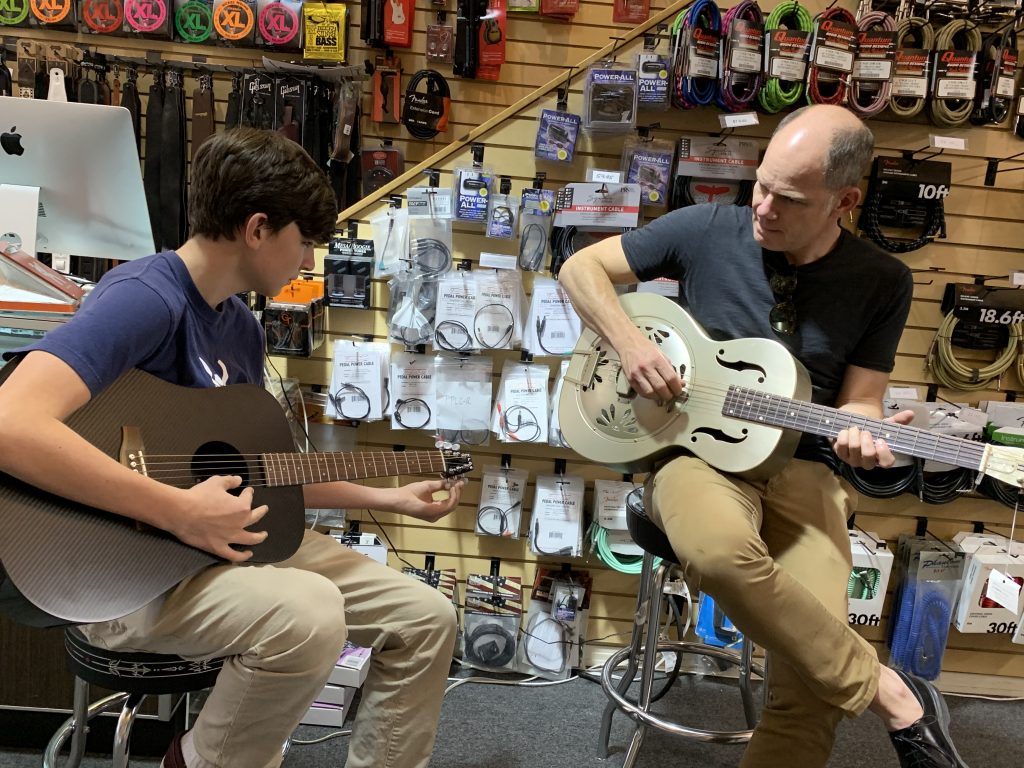
A father and son play and tune their guitars. 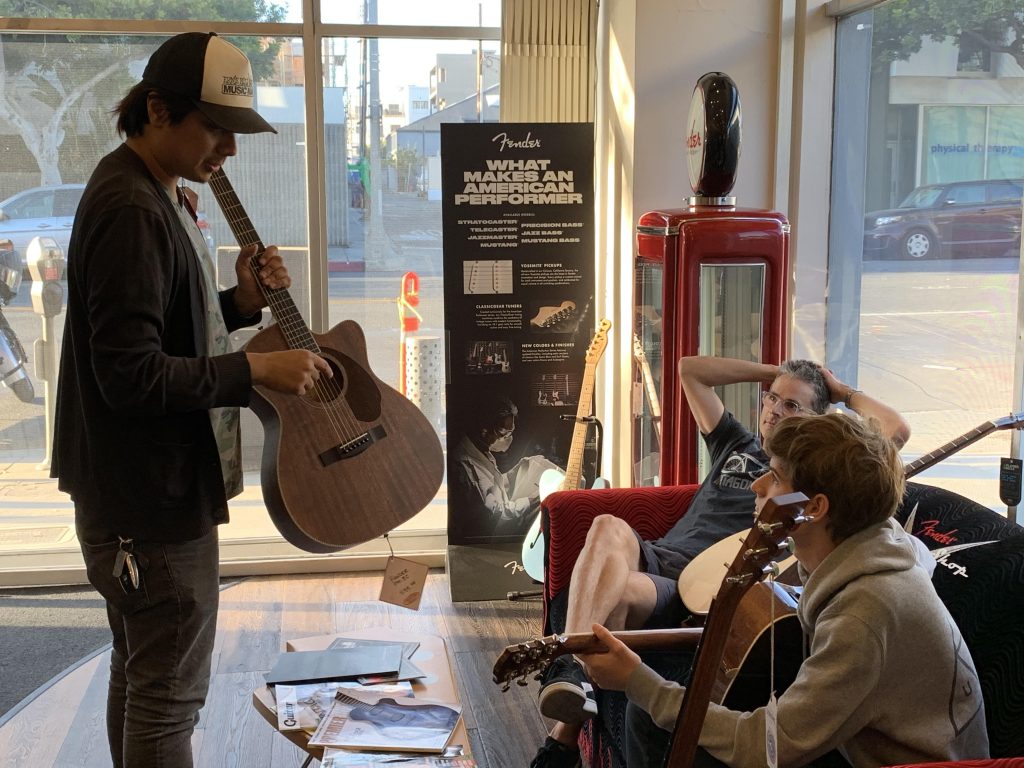
A TrueTone employee explains the features on this acoustic guitar to a customer. 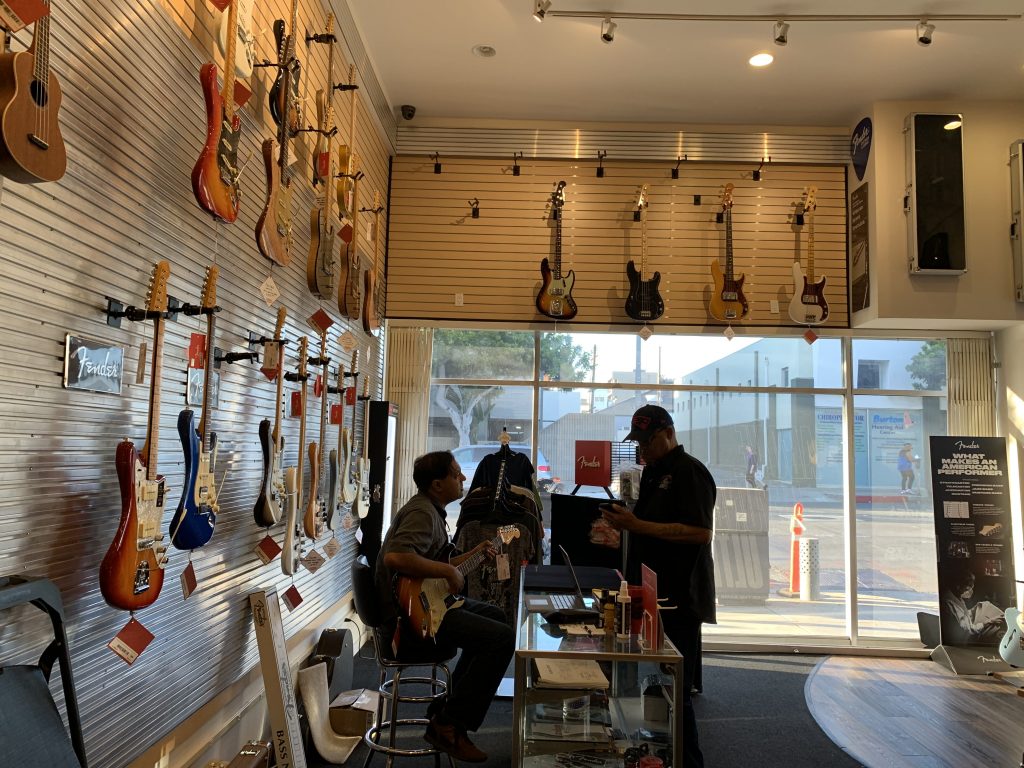
Sunir Patel speaking with a customer.
Since their opening nearly 20 years ago, TrueTone has provided both repair services and lessons for beginner and intermediate musicians.
Teacher Shawn Fleming has spent more than 20 years teaching genres reaching from rhythm and blues to classical. Fleming was “booked every hour on the hour” on a recent Saturday afternoon. “These kids are pretty talented…because they want to be here,” said Fleming, “it isn’t their parents’ choice at the end of the day.”
TrueTone regulars like Alex Bowlin, 25, and Hayden Walker, 36, appreciate what the store has done to cater to their demographic.
“It’s like an ‘in the club’ sort of feel,” said Bowlin, “We just love checking out guitars, talking about all the specs…just geeking out over them.”
“Every time I come in, it’s like a first name basis. It’s great that the store is building relationships every time a customer buys new gear,” said Walker.
Despite what headlines may say about the instrument, the guitar is here to stay in these Southern California guitar stores.
“We’re not dead yet!” said Patel chuckling, “But we are adapting, and we’ll be ready if anything changes.”